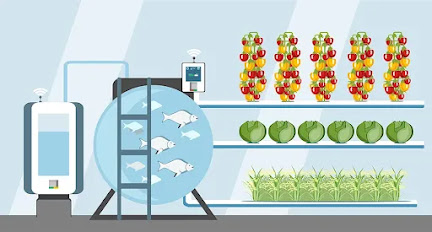Advantages: Aquaponics
The Advantages Of Aquaponics Systems
Aquaponics is a sustainable and eco-friendly approach to agriculture by combining aquaculture and hydroponics, where fish waste fertilizes plants. This innovative method significantly reduces water usage compared to traditional farming while promoting efficient nutrient recycling. Aquaponic systems yield both fresh, chemical-free produce and high-quality fish, making it a compelling solution for a resource-efficient and highly productive agricultural system.
Aquaponics has emerged as a shining beacon of hope, offering a harmonious synergy between aquaculture and hydroponics, with many benefits that extend far beyond the boundaries of traditional farming practices.
What Is Aquaponics?
Aquaponics is a cutting-edge and sustainable agricultural system that combines aquaculture (the cultivation of fish) with hydroponics (the cultivation of plants without soil). This innovative approach reimagines traditional farming by creating a symbiotic ecosystem where fish and plants mutually benefit each other.
Advantages Of Aquaponics
- Resource Efficiency & Water Conservation
Water scarcity is a growing global concern, and traditional agriculture is a notorious water consumer. Aquaponics, on the other hand, is a water-efficient marvel, making resource efficiency one of the main advantages of aquaponics.
- Reduced Environmental Impact
One of the compelling advantages of aquaponics is its capacity to reduce environmental impact. Traditional farming is associated with many ecological challenges, from soil degradation and pesticide contamination to deforestation and greenhouse gas emissions. In contrast, aquaponics mitigates many of these issues.
- Soil Conservation:
In aquaponics, plants grow directly in a soilless medium, eliminating the need for vast tracts of arable land. This is particularly valuable in urban areas or places with poor-quality soil. It also prevents soil erosion, a significant problem in traditional farming.
- Pesticide-Free:
The closed-loop system minimizes the risk of pests and diseases, reducing the need for chemical pesticides. This translates to safer, healthier produce that doesn’t carry pesticide residues.
- Energy Efficiency:
Aquaponics systems can be designed to operate with low energy consumption. Pumps are used to circulate water, but these can be powered by renewable energy sources such as solar power, further reducing the carbon footprint.
- Year-Round Crop Production
One of the limitations of traditional farming is its dependence on seasons. Crops can only be grown during specific times of the year, subject to weather conditions and daylight hours. Aquaponics, however, is not bound by these constraints.
- Faster Growth & Higher Yields
Plants in aquaponic systems tend to grow faster and produce higher yields compared to traditional soil-based cultivation. This can be attributed to the optimized nutrient delivery. In aquaponics, nutrients are readily available to plants, resulting in rapid growth and more abundant harvests.
- Organic & Chemical-Free Produce
Chemical fertilizers and pesticides used in conventional agriculture can introduce harmful substances into our food supply and negatively impact the environment.
- Dual Harvest
Aquaponics also offers a dual benefit by producing both vegetables and fish simultaneously. In the fish tanks, various species, such as tilapia, trout, or catfish, can be cultivated. These fish provide a source of high-quality, protein-rich food. Simultaneously, the plant beds yield vegetables, herbs, and fruits.
- Nutrient Recycling & Sustainability
Aquaponics is a model of nutrient recycling. The waste generated by fish, primarily in the form of ammonia, is broken down by beneficial bacteria into nitrites and nitrates.
- Scalability & Adaptability
The flexibility of aquaponics is a notable advantage. It can be scaled to suit various needs, from small home systems to large commercial operations.
- Diversification Of Agriculture
Aquaponics introduces diversity into agriculture. The ability to cultivate both plants and fish diversifies the food supply chain. This diversification can be crucial for resilience in the face of climate change and other challenges that may affect traditional agriculture.
Summary
Aquaponics offers a spectrum of benefits that span from resource efficiency and water conservation to the diversification of our food supply. With its remarkable capacity to reduce environmental impact, promote year-round crop production, and provide organic, chemical-free produce, aquaponics serves as a model for the agriculture of the future.




Comments
Post a Comment